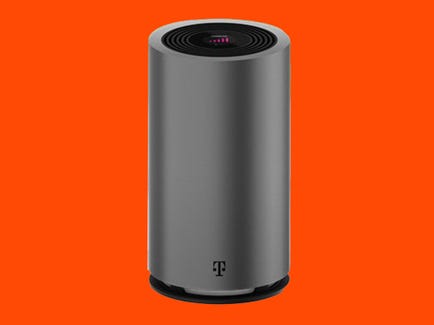 Why You Can Trust CNET
Why You Can Trust CNET Verizon 5G Home Internet vs. T-Mobile Home Internet: Can You Trust a Mobile Company for Your Home's Broadband?
Both of these big cellular providers can get your household online with fixed wireless broadband service. How do they compare?
In this article:
- Verizon and T-Mobile 5G Home Internet plans
- Plans and prices comparison
- Coverage map
- Deals and promotions
- Customer satisfaction
- FAQs
5G continues to roll out nationwide, offering millimeter-wave cellular speeds at higher, faster frequencies than 4G LTE. That's great news for our phones and other smart gadgets connecting over cellular airwaves. It could be a game-changer for our homes, too. With the potential for near-gigabit speeds over the air that rival cable and fiber internet service providers -- plus the added appeal of straightforward, consumer-friendly terms that ditch data caps, equipment fees and the like -- 5G is shaping up as one of the most exciting things to happen to residential internet in years.
But the first hurdle is whether 5G home internet service is available at your address. 5G signals don't reach everywhere, and you might not be eligible for home broadband service even when they do. That said, Verizon and T-Mobile are the providers doing the most to expand the technology's availability for home internet use. (Note: For now, AT&T doesn't have a 5G home internet product but focuses on fiber to bring homes online.) Both providers offer dedicated 5G home internet plans that promise fast speeds and simple terms at an affordable rate. In some areas, you might even find that your home is serviceable by both, as CNET's own Eli Blumenthal discovered in his quest to replace his cable provider.
Time will tell how much 5G stands to disrupt the ISP category. Let's look at how Verizon 5G Home and T-Mobile Home Internet match up.
Locating local internet providers
Verizon 5G Home Internet uses ultrawideband 5G technology to deliver max download speeds close to 1 gigabit and average download speeds of 300 megabits per second. That's the fastest average download speed delivered by a major fixed wireless provider. What it sacrifices is coverage, as it's currently available to about 40 million households nationwide. That said, the provider aims to increase that number to reach 50 million by 2025.
T-Mobile Home Internet is fairly new on the block: CNET took an early look at the service in February 2021 and descended upon the country in full in April of that year. Yet, it's got the widest reach of any fixed wireless internet provider. By utilizing its 4G LTE network and the expanding 5G grid, T-Mobile has aggressively expanded its coverage map and offered its service to more households than Verizon's 5G solution. While the average download speed sits around 100Mbps, that might be plenty of pep for some customers, especially those in rural areas where satellite and DSL might have previously been the best options.
Overview of Verizon and T-Mobile 5G home internet plans
| Provider/plan | Max speeds | Monthly price (with Auto Pay) | Equipment fee | Data cap | Contract | Price guarantee |
|---|---|---|---|---|---|---|
| Verizon 5G Home | 85-300Mbps download, 10Mbps upload | $50 ($25 with qualifying Verizon Unlimited mobile plan) | None | None | None | 2 years |
| Verizon 5G Home Plus | 300-1,000Mbps download, 50Mbps upload | $70 ($35 with qualifying Verizon Unlimited mobile plan) | None | None | None | 3 years |
| T-Mobile Home Internet | 33-182Mbps download, 6-23Mbps upload | $50 ($30 for eligible Magenta MAX mobile customers) | None | None | None | For as long as you remain a customer |
Verizon 5G Home vs. T-Mobile Home Internet: Prices and plans
Are you tired of deciphering which broadband package to choose out of countless options? Wary of signing up for a long-term contract with penalties looming if you don't fulfill it? Sick of sweating it out every month with a stingy data cap? No worries! Both Verizon and T-Mobile lean into providing a no-strings-attached broadband experience. Each offers simplified 5G home internet plans requiring no term agreement or data caps.
One small difference you'll notice is there are two choices for Verizon: Verizon 5G Home and Verizon 5G Plus. Verizon 5G Home comes with a two-year price guarantee and lower download speeds, while Verizon 5G Plus locks in your price for three years, plus higher download speeds and additional perks (see the perks and promos section below).
T-Mobile vs. Verizon: Which is faster?
While 5G can reach gigabit download speeds, don't expect those top-end numbers from either provider's home internet product. T-Mobile, for example, says on its site that customers can expect "average download speeds in excess of 100Mbps," and typically experience ranges from 33-182Mbps. Why so relatively low? T-Mobile Home Internet relies on its growing 5G grid and existing 4G LTE network to expedite its availability. So don't expect a pure 5G experience.
"During congestion, Home Internet customers may notice speeds lower than other customers due to data prioritization," reads the first sentence of T-Mobile Home Internet's general terms. "Service may be slowed, suspended, terminated, or restricted for misuse, abnormal use, interference with our network or ability to provide quality service to other users."
On the other hand, Verizon tells its subscribers to expect average download speeds of around 300Mbps. Verizon's dependence on its Ultra Wideband 5G network (and lesser use of its "4G LTE backup") is the main reason for the faster speeds. It uses low-band, midband and millimeter-wave technology to provide customers with speeds that could get as high as 1,000Mbps.
Verizon vs. T-Mobile: Where's the best value?
While a cursory glance at the chart above might lead you to believe that T-Mobile is the better buy -- $50 a month vs. Verizon's top plan at $70 per month -- it's essential to look at the cost per Mbps to better understand the actual value. Considering the average download speed of 100Mbps for that $50 a month fee, T-Mobile rings in at 50 cents per Mbps, comparable to what you might pay for a midrange cable internet plan. If you have a qualifying Magenta MAX mobile plan, you could trim that to $30 monthly or 30 cents per Mbps.
Verizon, which averages 300Mbps, shaves that amount down to a cost per Mbps of just under 17 cents. Also, if you choose the Verizon 5G Plus plan, your monthly bill is $70 a month, and that cost per Mbps goes up to just under 24 cents. But your additional perks might make up for it, depending on how you feel about the worth of an Xbox Series S or a $200 Home Depot gift card. Finally, customers with qualifying Verizon mobile plans will get 50% off the monthly cost of either plan. Suppose you're able to make use of that additional discount. In that case, it makes Verizon 5G Home -- the Plus plan at just shy of 12 cents per Mbps and the regular plan at an even better 8 cents per Mbps -- one of the most affordable out there compared to any cable and fiber internet plans by competitors.
What about the fine print?
Let's revisit that idea of the no-strings-attached internet experience. Verizon and T-Mobile are eager to get customers to try their 5G home internet offerings, so no hidden fees or taxes are added to the monthly cost. We mentioned before that there's no contract and no data cap. There's also no additional equipment rental fee, installation fee or other trap fees (though T-Mobile does charge a one-time, $35 activation fee). So it's a win-win for both providers and their customers.
Verizon 5G Home vs. T-Mobile Home: Where can you get it?
The latest Federal Communications Commission data puts T-Mobile Home Internet covering just over 89% of the US population.
Neither provider offers a detailed coverage map for its 5G home internet solution. But taking into account the total list of cities they claim to cover and the total number of households, T-Mobile is pretty clearly in the lead here. Still, Verizon closed the gap when it unveiled its 5G Ultra Wideband network in mid-January 2022.
While Verizon 5G Home Internet is available to approximately 40 million homes nationwide, T-Mobile Home Internet reaches over 50 million households in just over 600 cities nationwide. In contrast, Verizon's service is available in parts of 900 cities but fewer homes.
To save your eyeballs (and our word count), we won't list the 600-plus T-Mobile cities here, but you can peruse this T-Mobile Home Internet PDF if you'd like to scan them for yourself. Verizon has not yet made available a list of the 900 cities in which its 5G Home Internet service can be found, but you can use its Check Availability tool here.
Verizon 5G Home vs. T-Mobile Home Internet: Deals and perks
Still not convinced by the straightforward terms both T-Mobile and Verizon put forward? They'll try to sway you with their promotional offers.
First, both T-Mobile and Verizon are so confident in their 5G home products that each offers to pay off any early termination fees for new customers who break their current ISP contract, up to $500 for Verizon and $750 from T-Mobile.
Second, they each offer deep discounts for eligible mobile customers. T-Mobile will knock off $20 per month for Magenta Max subscribers. Verizon goes even further and offers a 50% discount for those with select mobile plans.
Additionally, T-Mobile offers new Home Internet customers six months free of SiriusXM (worth $66) and 12 months free of the streaming service ViX Plus. It also allows you to subscribe to live TV through Philo TV for $15 per month, which is $10 off the regular price. Finally, all home internet subscribers can use T-Mobile Tuesdays, the company's weekly discount program.
Verizon's perks are tilted towards its 5G Home Plus tier. New Verizon 5G Home Plus customers will get their choice of either an Xbox Series S console or a $200 Home Depot gift card. Verizon 5G Home Plus subscribers can also get $300 off a Stream TV Soundbar.
Verizon 5G Home vs. T-Mobile Home: What do customers say?
We refer to two of the top customer satisfaction surveys on our ISP reviews -- J.D. Power and the American Customer Satisfaction Index -- and they place Verizon at the top of their rankings. But those residential internet surveys are focused on Verizon Fios, a fiber internet service, not specifically the Verizon 5G Home Internet option. So, the verdict is unclear on the company's 5G fixed wireless internet product.
On the other hand, T-Mobile Home Internet -- which has only been on the market for two years -- was included for the first time in the ACSI's 2022 survey results. It came out of the gates strong with a 71 out of 100, second only to Verizon Fios and well above the industry average of 64 points.
Anecdotally, one of our CNET writers tested T-Mobile during its pilot program and preferred it over his previous provider, Comcast Xfinity.
Lastly, PCMag's most recent Readers' Choice awards tagged Verizon 5G Home Internet with the highest overall ratings among wireless providers, with an 8.1 score on a scale from 0 to 10. That's well above the survey's average ISP score of 6.9. T-Mobile Home Internet was not far behind with a 7.7 score. Both landed in the top 10 of all ISPs for overall customer satisfaction. Not too shabby, I'd say.
Verizon 5G Home or T-Mobile Home Internet: Too early to call?
T-Mobile and Verizon are still aggressively building their 5G networks, so we're much nearer the story's beginning than the middle or end, especially regarding 5G fixed wireless internet overall.
Regarding these two providers, T-Mobile Home Internet has a slight edge in availability. Adding its 4G LTE network to 5G makes it a much more viable pick, particularly in rural and underserved areas of the country, where it's a compelling alternative to options like satellite or DSL. But Verizon 5G Home Internet takes the lead in performance, featuring nearly triple the current download speeds of T-Mobile Home Internet. As such, Verizon seems poised to provide a higher upside in the immediate future in cities where the two overlap.
Verizon 5G Home vs. T-Mobile Home Internet FAQs
Is T-Mobile Home Internet better than Verizon 5G Home?
It depends on how you define "better." T-Mobile Home Internet is available to more households than Verizon 5G Home Internet, so it's got the edge there. However, Verizon 5G Home boasts a higher average download speed (300Mbps to 100Mbps), so it can claim a win in that category. Ultimately, the product that will be best for you is the one that's available at your address and can provide enough download speed to enable your household to do what it needs to do.
Can you work from home using Verizon 5G Home or T-Mobile Home Internet?
Yes. Verizon 5G Home Internet and T-Mobile Home Internet should provide over and above the FCC's broadband speed definition of at least 25Mbps download and 3Mbps upload. Both fixed wireless products, in urban and suburban areas, won't give you as many options as some cable and fiber providers. Still, on the flip side, Verizon 5G Home and T-Mobile Home Internet are cheaper (especially with their mobile discounts) and you'll have the opportunity to try them out at very little risk to see if they'll be adequate for your home office needs.
Are Verizon 5G Home and T-Mobile Home Internet better than fiber?
T-Mobile Home Internet and Verizon 5G Home Internet can't match fiber internet's symmetrical download and upload capabilities. Also, due to the nature of their cellular connections (where 5G home internet customers might find themselves deprioritized to mobile customers on the network), they won't be able to equal fiber's performance reliability. Where Verizon and T-Mobile might have the edge is on availability. The reach of 5G home internet is expanding faster than fiber, so Verizon 5G Home and T-Mobile Home Internet have advantages there.




